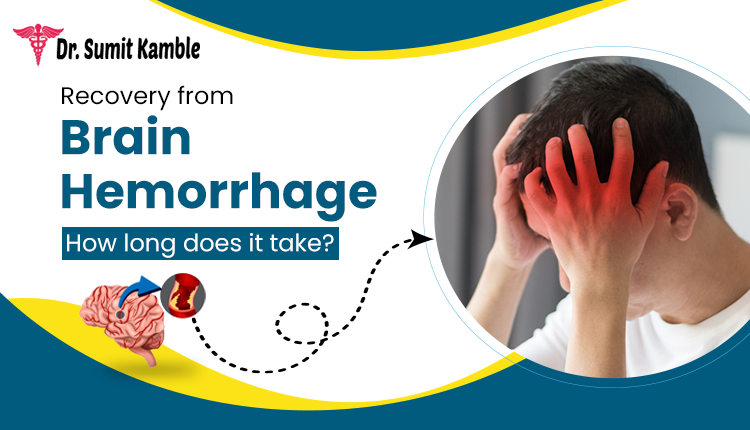Recovery from Brain Hemorrhage: How long does it take?

Imagine a sudden rupture of your brain’s complex network of blood arteries, inflicting a sense of uncertainty and dread. For the ones coping with brain hemorrhaging, this scenario is all too real. Despite the turbulence, there is a gleam of hope. This blog will take you on an exciting experience to find the mystery of brain hemorrhage recovery time. From the initial shock to the onerous journey to healing, we methodically map the course of rehabilitation, delving into several elements that decide its period. Let us take the way to recovery one step at a time.
What is Brain Hemorrhage?
To begin with, let’s discover brain haemorrhage and its basics!
- Brain hemorrhage, additionally called intracerebral hemorrhage, takes place while a blood vessel inside the brain ruptures, inflicting bleeding into surrounding tissue.
- This bleeding puts strain on brain cells, resulting in neurological impairments and serious consequences.
- A variety of reasons can contribute to brain haemorrhage, which include excessive blood strain, disturbing accidents, aneurysms, arteriovenous malformations (AVMs), and medical issues or some medications.
- Brain hemorrhage symptoms may also encompass an abrupt, robust headache, unilateral weakness or numbness, speech issue, and loss of attention.
- Urgent scientific treatment is needed to hit and deal with brain hemorrhage, which regularly consists of diagnostic imaging investigations, pharmaceutical interventions to stop bleeding and relieve pressure, and, in a few instances, surgical interventions to restore broken blood arteries.
If you want to know more about brain hemorrhage then connect with a neurologist in Jaipur.
How do you treat brain hemorrhage?
Next, we explore the ways to treat the problem of brain haemorrhage and how it decries the brain hemorrhage recovery time.
- The severity of the problem, the place of the bleeding, and the reason for haemorrhage all play a function in figuring out the satisfactory treatment approach for brain hemorrhage.
- Opt for immediate scientific intervention to prevent bleeding and extra harm.
- You might have to undergo emergency surgical intervention in case of blood clot removal, reducing cerebral pressure, or repairing damaged blood arteries.
- You may require diligent monitoring to intently take a look at important symptoms, neurological state, and intracranial pressure.
- Kickstarting rehabilitation efforts, which include physical, occupational, and speech therapy, can help restore capabilities and enhance lifestyle.
- Your healing journey may additionally encompass taking blood pressure medicine, making way-of-life adjustments, and attending normal follow-up appointments to song progress and prevent recurrences.
What is the brain hemorrhage recovery time?
Are you worried about how long it will take for things to be normal again? Don’t worry, we have got you all covered!
- The severity of your bleeding, the level of damage, and your specific traits add up to decide your recovery time.
- If you encounter small hemorrhages and little neurological impairments, you will get better in weeks to months with suitable medical care and rehabilitation. However, if you had moderate to excessive hemorrhages, and underwent surgical intervention, be prepared mentally for a lengthy restoration duration starting from months to years.
- Initially, the point of interest of restoration is stabilizing the affected person, coping with bleeding, and coping with on the spot issues. The next levels consist of excessive therapy aimed at regaining lost features and enhancing normal lifestyles.
- Rehabilitation tactics often encompass a whole lot of modalities, together with bodily remedy to repair power and mobility, occupational remedy to improve everyday functioning, and speech remedy to cope with conversation troubles.
- Recovery development may additionally occur step by step, with individuals suffering setbacks and obstacles alongside the manner. Long-term restoration consequences vary, with some sufferers experiencing notable purposeful improvement whilst others may additionally struggle with permanent disabilities from brain hemorrhage recovery time.
- Consistent medical observation, persevered assistance from healthcare providers, and adherence to rehabilitation plans are important for achieving foremost healing consequences and fostering well-being.
Is it possible to fully recover from a brain hemorrhage?
Yes, definitely! However, it depends on some occasions, such as the severity of the brain hemorrhage.
- Individuals with modest hemorrhages and minor neurological impairments have a higher chance of full restoration with customised medical interventions and intensive rehabilitation programs.
- Cases with high intensity hemorrhages or giant brain harm make entire recovery hard.
- Lingering signs and symptoms or issues can also remain despite cautious rehabilitation efforts, especially in conditions of extreme brain damage. – Consistent follow-ups to medical care, involvement in rehabilitation programs, and adoption of supporting way of life changes all assist to optimise the recovery trajectory and achieve greater effects.
Conclusion
The route to brain hemorrhage recovery time is as one of a kind as the human beings it influences. The period of recovery relies upon the severity of the bleeding and how humans respond to treatment. Nonetheless, the wish is a non-stop companion. Patients navigate recovery with dedication and help from professional professionals inclusive of Dr. Sumit Kamble. Although the path can be hard, every breakthrough represents progress towards a patient’s well-being. Patients go on a transforming adventure toward expanded vitality and fitness, trusting in the journey and receiving assistance along the way.
Why choose Dr Sumit Kamble for your brain hemorrhage?
When it comes to brain hemorrhage remedy choices, Dr Sumit Kamble presents a completely unique mixture of expertise and custom-designed care. His immense experience in neurosurgery, mixed with specialised training, allows him to address each case with precision and capacity. The best neurologist in Jaipur, Dr Kamble’s technique emphasises patient involvement, resulting in considerable assessment and individualised remedy regimens to meet character desires. He attempts to improve healing results by staying updated on the most recent advances in neurosurgical methods. Trust Dr. Sumit Kamble’s concerned counselling that will help you navigate your brain hemorrhage recovery time with confidence and calm. Back an appointment now!

 Previous Post
Previous Post Next Post
Next Post